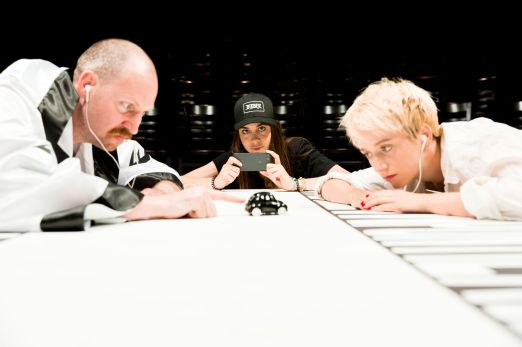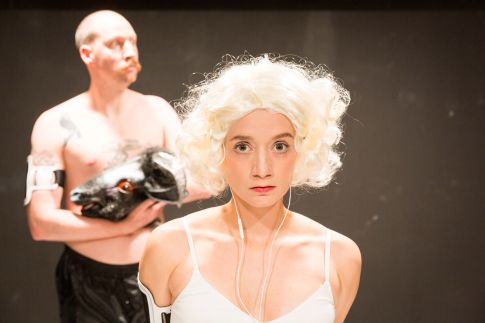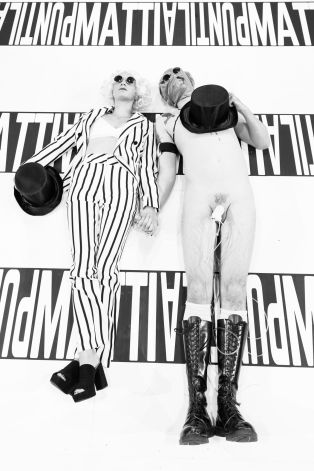
DOPPELGANGSTER AND THE MARXIST DIALECTIC. (PUNTILA/MATTI THEATRE REVIEW)
OCTOBER 2, 2017
For John Paul Sartre, bourgeois theatre presents images. In his words, that is: “The image of man as eternally unchanging in a universe that never changes.” This is the image of a subject, on a stage, fixed and unquestioned. This then stands as a methodological assumption, an a priori facticity that shapes and limits the way one understands the world. Thus far, theatre has refused the what film has been unable to resist (the colonization of the passive observer – reflexivity is reversed such that the film image is a passive thought loop) but if theatre is in danger of being colonized by this passivity it will happen via power (the big end of town v’s the small) and polish (the eradication of text through the quirky theatrical device, set or pristine spectacle.)
For Sartre, contrary to bourgeois theatre, Brecht’s theatre presents objects. These objects present data removed, extracted, indeed liberated from the thwarting of bourgeois ideology. Rather than the representational icons of cheap psychological and ideological constructs, these objects present the social man. We bare witness to modernity as if we are inside it, not reflecting on it, seeing ourselves as others as if people were looking at us. This is an objectivity you cannot get from your reflection. It is in this spirit Doppelgangster present Puntila/Matti, spliced out of a Brechtian/Wuolijokian world and delivered, via telephonic device, to myself as object. I am Puntila, I am Matti, I am Eva, I am the judge, I am the four wives and I am the audience. I am the woman sawn in half, the spectacle I demand by trading finances for my ticket. At the door of the Kings Cross Theatre for this plays duration, your ticket does not buy you the right to demand compromise in favour of your complicit impulses (as we strangely presume it does) rather it takes flight into the belly of creatives who are forced by it to show us to ourselves. Here we are self-reflective anthropologists in that we are forced to see ourselves for the first time and refuse pre-conceived notions and default understandings on behalf of providing an account or explanation. In this way the audience recognizes itself, but in a strange guise as if someone else. We bring ourself into being as an object before our own eyes and we see ourselves without playing ourselves as a role. As Sartre would say, in this way the object comes to understand itself.

This refusal of bourgeois ideology is delivered in Puntila/Matti via surprise and in making the familiar unfamiliar. Our drive to recognise, understand, relax, engage and reflect is interrupted at every turn. We live outside bourgeois language and ideology. Matti is an Uber driver, actors receive their lines from their phones (either through an unseen prompt or plugged into online itself) and repeat or refuse them, the wives are chosen from contestants on a game show, staging is a boxing ring and the judge (or lawyer) is dead before they speak. It is a liberation from language, a return to essence, the thing in itself. It all means everything and nothing; phenomenal reduction is predicated on doubt. We are reluctant to accept the taken-for-granted. Here there is no inheritance unless it is inverted. Even the greatest symbol – Matti as woman – is provided as vessel empty of presumption. Dopplegansgter present contradictions and in doing so offer a fresh Marxist perspective to the audience. For the object removed of bourgeois ideology to be correctly observed, its truth must be presented and seen dialectically. Puntila is white male, Nazi, boxer, plagiarist, Brecht, Marx, AcToR, Artistic director and the anti-bourgeois-bourgeoisie. Matti is passive, divided, quietly resistant, observant, rising, arrived and then removed. Both are irony and its refutation together.

Puntila/Matti is a marvelous, thrilling production of that rare kind for Sydney – highly intellectually challenging. It’s Romper Stomper aesthetic belies its punk uniform, even as Tobias Manderson-Galvin looks like a character from American History X sporting a bedraggled (but only partially read) copy of ‘Less Than Nothing.’ He writes (plagiarism he calls it) Brecht post-Sartre and into Badiou territory, taking the great poet and theatre director with him into this new age of a perpetually transforming post-power plea for an anti-capitalist-totalitarian being. He is watched and gently usurped (at every ironic and delightful turn) but the sublime Grace Lauer as the hypnotic feminine divine, the endless transformation. The pair are bookended by theatre itself, the play, the text, our great impotent ‘instruction’ personified in Antoinette Barboutis, and music by Jules Pascoe. Puntila/Matti is marvelous, exciting, frightening theatre that will have you puzzled and yet knowing at precisely the same time.


Sorry, the comment form is closed at this time.